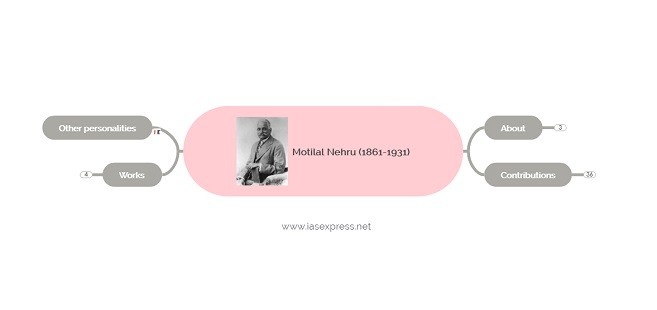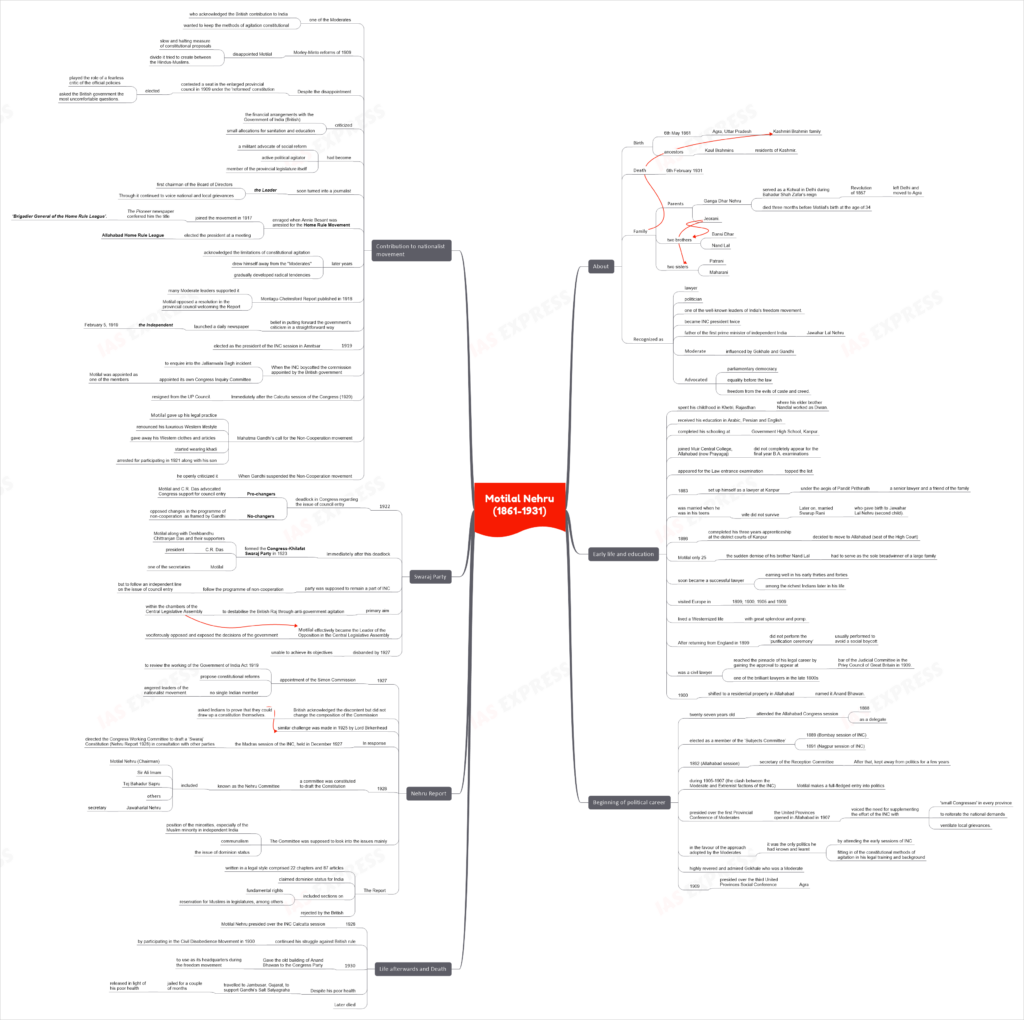Motilal Nehru (1861-1931) – Biography, Contributions, Report

Prelims Sureshots » Important Personalities of Modern India
Motilal Nehru (1861-1931) was a lawyer, politician and one of the well-known leaders of India’s freedom movement. He also served as a member of the Indian National Congress (INC) and became its president twice. He was an important figure in India’s freedom struggle and is mainly known for being the father of the first prime minister of independent India, Jawahar Lal Nehru. Motilal’s political philosophy was derived from his long association with the Indian National Congress (INC); it had been influenced by Gokhale and Gandhi who advocated parliamentary democracy, equality before the law, and freedom from the evils of caste and creed.
This topic of “Motilal Nehru (1861-1931) – Biography, Contributions, Report” is important from the perspective of the UPSC IAS Examination, which falls under General Studies Portion.
Early life and education
- Motilal Nehru was born on 6th May 1861 in Agra, Uttar Pradesh in a Kashmiri Brahmin family. His ancestors were Kaul Brahmins and residents of Kashmir.
- Motilal’s parents were Ganga Dhar Nehru and Jeorani. His father served as a Kotwal in Delhi during Bahadur Shah Zafar’s reign but when the Revolution of 1857 took place, he left Delhi and moved to Agra where Motilal was born.
- Motilal’s father died three months before his birth at the age of 34.
- Motilal had two brothers, Bansi Dhar and Nand Lal, and two sisters Patrani and Maharani.
- Motilal spent his childhood in Khetri, Rajasthan where his elder brother Nandlal worked as Diwan.
- He received his education in Arabic, Persian and English and completed his schooling at Government High School, Kanpur.
- He later joined Muir Central College, Allahabad (now Prayagaj) but did not completely appear for the final year B.A. examinations. Later he appeared for the Law entrance examination and topped the list.
- In 1883, he set up himself as a lawyer at Kanpur under the aegis of Pandit Prithinath, a senior lawyer and a friend of the family.
- Motilal was married when he was in his teens but his wife did not survive. Later on, he was married to Swarup Rani who gave birth to Jawahar Lal Nehru (second child).
- In 1886, Motilal decided to move to Allahabad (seat of the High Court) after completing his three years apprenticeship at the district courts of Kanpur.
- However, the sudden demise of his brother Nand Lal dealt a severe blow to Motilal and at the age of 25 only, he had to serve as the sole breadwinner of a large family.
- Motilal soon became a successful lawyer and was earning well in his early thirties and forties and was among the richest Indians later in his life.
- He visited Europe in 1899, 1900, 1905 and 1909. Motilal lived a Westernized life with great splendour and pomp.
- After returning from England in 1899, he did not perform the ‘purification ceremony’ usually performed to avoid a social boycott.
- Motilal was a civil lawyer and reached the pinnacle of his legal career by gaining the approval to appear at the bar of the Judicial Committee in the Privy Council of Great Britain in 1909.
- He was regarded as one of the brilliant lawyers in the late 1800s.
- In 1900, Motilal shifted to a residential property in Allahabad which he named Anand Bhawan.
Beginning of political career
- Motilal was twenty-seven years old when he attended the Allahabad Congress session in 1888 as a delegate.
- In 1889 (Bombay session of INC) and 1891 (Nagpur session of INC), he was elected as a member of the ‘Subjects Committee’.
- In 1892 (Allahabad session), he was the secretary of the Reception Committee. After that, Motilal kept away from politics for a few years.
- It was during 1905-1907 (the clash between the Moderate and Extremist factions of the INC) that Motilal makes a full-fledged entry into politics.
- Motilal presided over the first Provincial Conference of Moderates in the United Provinces opened in Allahabad in 1907 and here he voiced the need for supplementing the effort of the Indian National Congress (INC) with ‘small Congresses’ in every province, to reiterate the national demands and to ventilate local grievances.
- Motilal was in the favour of the approach adopted by the Moderates because it was the only politics he had known and learnt by attending the early sessions of INC added with the fitting in of the constitutional methods of agitation in his legal training and background.
- Motilal also highly revered and admired Gokhale who was a Moderate.
- In 1909, Motilal presided over the third United Provinces Social Conference at Agra.
Contribution to the nationalist movement
- Motilal was one of the Moderates who acknowledged the British contribution to India and wanted to keep the methods of agitation constitutional.
- However, the Morley-Minto reforms of 1909 disappointed Motilal not only for their slow and halting measure of constitutional proposals but also for the divide it tried to create between the Hindus-Muslims.
- Despite the disappointment from reforms, Motilal contested a seat in the enlarged provincial council in 1909 under the ‘reformed’ constitution and was elected where he played the role of a fearless critic of the official policies and asked the British government the most uncomfortable questions.
- He criticized the financial arrangements with the Government of India (British) and small allocations for sanitation and education.
- Motilal had become a militant advocate of social reform, an active political agitator and a member of the provincial legislature itself.
- He soon turned into a journalist and was the first chairman of the Board of Directors of the Leader. Through the Leader, Motilal continued to voice national and local grievances.
- Motilal was enraged when Annie Besant was arrested for the Home Rule Movement and joined the movement in 1917. He was elected the president at a meeting of the Allahabad Home Rule League.
- The Pioneer newspaper conferred him the title ‘Brigadier General of the Home Rule League’.
- In his later years, Motilal acknowledged the limitations of constitutional agitation and drew himself away from the “Moderates”.
- When Montagu-Chelmsford Report was published in 1918, many Moderate leaders supported it but Motilal opposed a resolution in the provincial council welcoming the Report.
- Given Motilal’s gradually developed radical tendencies and his belief to put forward the government’s criticism in a straightforward way, he launched a daily newspaper the Independent on February 5, 1919.
- He was elected as the president of the INC session in Amritsar in the same year (1919).
- When the INC boycotted the commission appointed by the British government to enquire into the Jallianwala Bagh incident and appointed its own Congress Inquiry Committee, Motilal was appointed as one of the members of the committee along with M.K.Gandhi, C.R.Das, M.R. Jayakar and Abbas Tayabji.
- Immediately after the Calcutta session of the Congress (1920), Motilal resigned from the UP Council.
- Following Mahatma Gandhi’s call for the Non-Cooperation movement, he gave up his legal practice. He renounced his luxurious Western lifestyle, gave away his Western clothes and articles and started wearing khadi.
- He was also arrested for participating in the Non-Cooperation Movement in 1921 along with his son.
- When Gandhi suspended the Non-Cooperation movement, he openly criticized the suspension of civil resistance in 1922.
Swaraj Party
- In 1922, there was a deadlock in Congress regarding the issue of council entry. Motilal and C.R. Das advocated Congress support for council entry (Pro-changers) while the No-changers opposed changes in the programme of non-cooperation as framed by Gandhi before his arrest.
- Immediately after this deadlock, Motilal along with Deshbandhu Chittranjan Das and their supporters formed the Congress-Khilafat Swaraj Party in 1923. It was recognised as the legislative wing of Congress (INC).
- C.R. Das was elected president and Motilal was one of the secretaries. Motilal played a decisive role in organizing and leading the Swaraj Party.
- The party was supposed to remain a part of INC and follow the programme of non-cooperation but decided to follow an independent line on the issue of council entry.
- The primary aim of the party was to destabilise the British Raj through anti-government agitation within the chambers of the Central Legislative Assembly.
- Motilal effectively became the Leader of the Opposition in the Central Legislative Assembly and vociferously opposed and exposed the decisions of the government.
- However, the party was disbanded by 1927 as it was unable to achieve its objectives.
The Nehru Report
- In 1927, the British government appointed the Simon Commission to review the working of the Government of India Act 1919 and propose constitutional reforms. The Commission had no single Indian member which angered leaders of the nationalist movement.
- The British in response acknowledged the discontent but did not change the composition of the Commission and instead asked Indians to prove that they could draw up a constitution themselves.
- A similar challenge was made in 1925 by Lord Birkenhead, the then Secretary of State for India, in the House of Lords.
- In response to these challenges, the Madras session of the INC, held in December 1927, directed the Congress Working Committee to draft a ‘Swaraj’ Constitution (Nehru Report 1928) in consultation with other parties.
- In 1928, a committee was constituted to draft the Constitution. The body came to be known as the Nehru Committee. This included Motilal Nehru (Chairman), Sir Ali Imam, Tej Bahadur Sapru and Subash Chandra Bose. M.R. Jayakar and Annie Besant joined the Committee later.
- Jawaharlal Nehru, Motilal Nehru’ son, was appointed the secretary to the Committee.
- The Committee was supposed to look into the issues mainly, the position of the minorities, especially of the Muslim minority in independent India, communalism and the issue of dominion status.
- The Report written in a legal style comprised 22 chapters and 87 articles, claimed dominion status for India and included sections on fundamental rights, and reservation for Muslims in legislatures, among others.
- The Report was rejected by the British.
Life afterwards and death
- In 1928, Motilal Nehru presided over the INC Calcutta session.
- Motilal continued his struggle against British rule by participating in the Civil Disobedience Movement in 1930.
- In the same year (1930), Motilal Nehru gave the old building of Anand Bhawan to the Congress Party to use as its headquarters during the freedom movement.
- Despite his poor health, Motilal participated in the Civil Disobedience movement and travelled to Jambusar, Gujarat, to support Gandhi’s Salt Satyagraha.
- He was jailed for a couple of months and was released in light of his poor health.
- Given his poor health condition, Motilal Nehru died on 6th February 1931.


